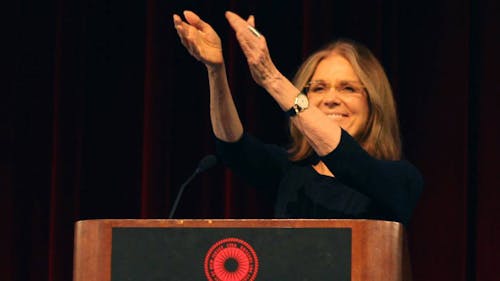Gloria Steinem Endowed Chair passes 2 million in funds

After a year and a half fundraising, the bank account for the Gloria Steinem Endowed Chair in Media, Culture and Feminist Studies has passed the $2 million mark.
The endowed chair will enable Rutgers to have a permanent focus on a particular set of academic and intellectual concerns, said Alison Bernstein, director for the Institute for Women’s Leadership.
“Gloria Steinem was a recipient of the Presidential Metal of Freedom, which is the highest civilian honor,” Bernstein said. “This is a person who, for decades, has fought for gender equality, has really been a game changer of how the culture thinks about women and men and how the media can be more gender sensitive and inclusive.”
The chair is a collaboration between Rutgers’ Institute for Women’s Leadership, the Department of Women’s and Gender Studies in the School of Arts and Sciences and the School of Communication and Information, Bernstein said.
Initial planning for the Endowed Chair in Gender and Media was carried by SC&I and IWL, said Jack Bratich, chair for the Department of Journalism and Media Studies.
“We were talking ... about the importance of having such a chair here at Rutgers, and have been involved with them ever since. We have been actively raising awareness and funds for this important initiative,” Bratich said.
The program would be a major accomplishment for SC&I as it would be the first Endowed Chair for the school, highlighting the school's commitment to socially engaged research and teaching, Bratich said.
“The (endowed) chair is the anchor for a variety of projects that would be part of the program,” he said. “Under the Women, Media and Technology Initiative, we have sponsored speakers, created media mentorships, developed internships and launched a Gender and Media minor."
The Endowed Chair would centralize these projects and provide a platform for new ones under the leadership of a key person in Gender and Media, Bratich said.
Bernstein added that since the chair is separately endowed, it cannot just be wiped away in the case of a budget crisis.
“Media is changing so rapidly that we didn’t feel we wanted someone who wasn’t on top of those changes," she said. "We will seek a senior distinguished individual ... that person will have a term at Rutgers and teach and lead at least one or two summits on themes of media and culture.”
The program seeks to raise awareness of gender as a central social issue in the world, especially when it comes to media culture, Bratich said.
“It will bring together scholars, media makers, teachers, and advocates to understand and change those imbalances,” Bratich said.
He also noted how the endowed chair relates to the current state of gendered media. Having a program devoted to speaking to these current issues as they arise would give Rutgers a key role in shaping the public discussion around media and gender issues.
The end goals are first and foremost to be a resource to Rutgers students and others across the board, especially in terms of introducing concepts of gender equity, fairness social justice, in how the media portrays men and women, Bernstein said.
“It’s an educational function,” she said. “What I think we want to demonstrate here is that we’re not just talking about women going into media. We’re talking about women in diverse populations and them being trained to be leaders in media to make key decisions. So it’s not just about education, it’s also preparing leadership.”
Gloria Steinem is a unique figure in U.S. history who has had a profound history on American culture, and culture around the world, Berstein said.
Steinem would like to make sure people continue to be aware about how those ideas can change the way people think.
“Rutgers is known for its historic commitment to gender-based scholarship, teaching, and organizing, especially with the world-renowned Douglass College,” Bratich said. “The Steinem Chair is a chance for the university to build on its commemoration of 250 revolutionary years by being a leader in understanding digital media culture and changing gender relations.”



